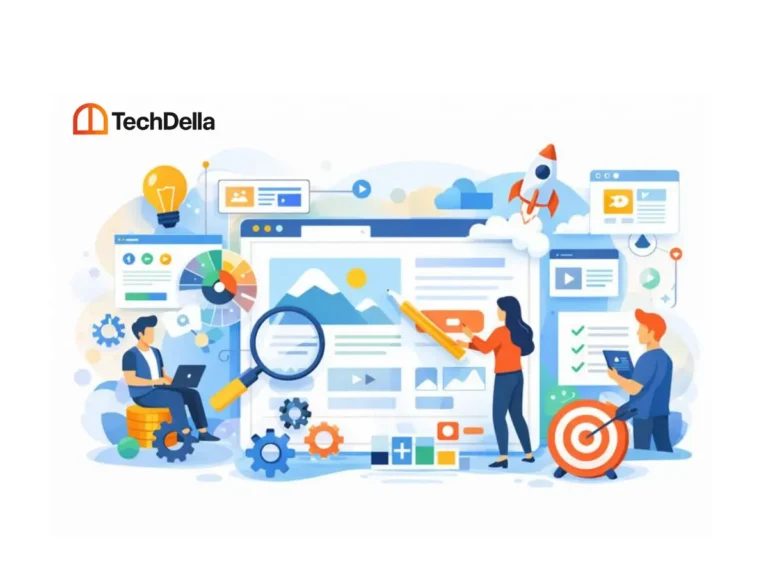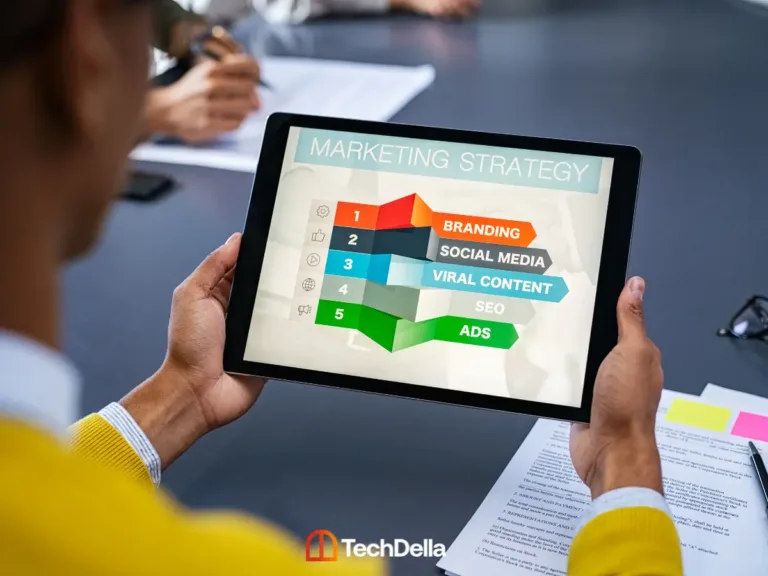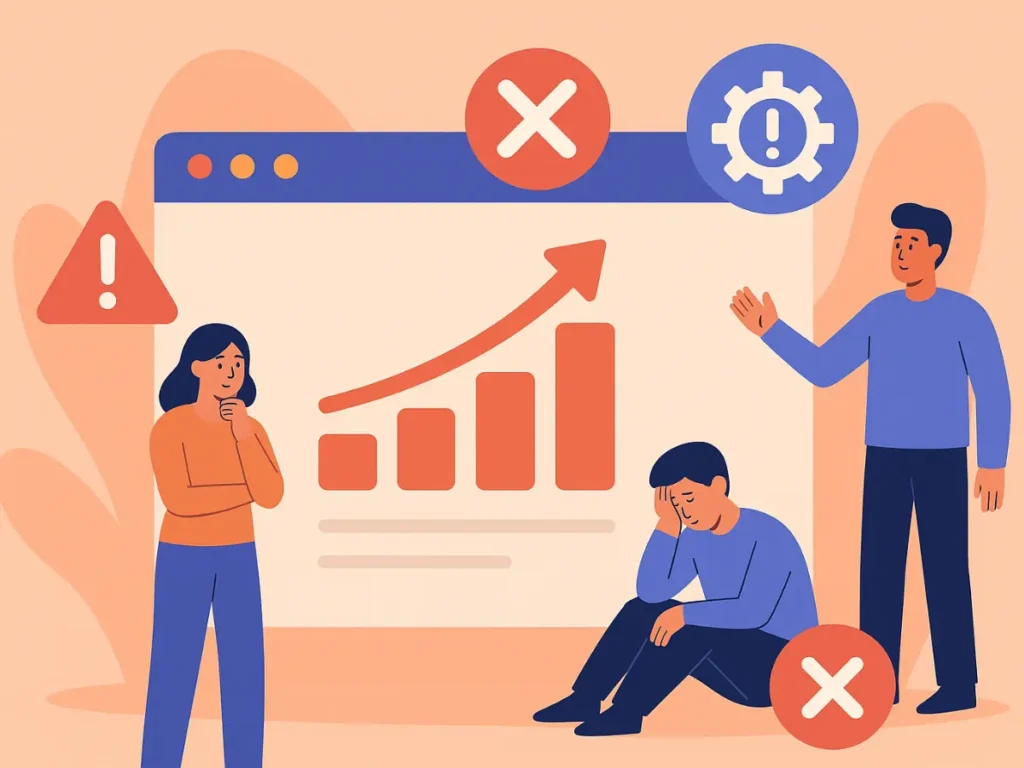
You’ve built a beautiful website, you’re driving traffic, but something’s not right. Visitors come, they look around, and then… they leave. Sound familiar? You’re not alone. Many business owners face this frustrating reality, and the culprit is often hidden conversion rate mistakes that are quietly sabotaging their success.
Think of your website as a store. You wouldn’t want customers walking in, browsing for a few minutes, and leaving empty-handed, would you? Yet that’s exactly what happens when website conversion issues go unnoticed. The good news is that most of these conversion rate problems are completely fixable once you know what to look for.
In this article, we’ll walk through the most common conversion rate mistakes that could be costing you customers and revenue. More importantly, we’ll show you exactly how to fix conversion rate issues so your website starts working as hard as you do for your business.
What are Conversion Rates
Before diving into the mistakes, let’s clarify exactly what we’re discussing. Your conversion rate is simply the percentage of website visitors who take a desired action, whether that’s making a purchase, signing up for your newsletter, downloading a guide, or filling out a contact form.
The average conversion rate across industries hovers around 2-3%. That means for every 100 people who visit your site, only 2-3 actually do what you want them to do. While this might seem low, it also represents a massive opportunity. Even small improvements in conversion rate optimization can dramatically impact your bottom line.
Understanding your conversion funnel is crucial here. This is the path visitors take from first discovering your website to completing your desired action. Every step in this journey presents an opportunity to either win or lose a potential customer. When conversion rate mistakes creep into any part of this funnel, they create friction that pushes visitors away.
The Most Costly Conversion Rate Mistakes (And How to Avoid Them)
Now let’s dive into the main issue. These conversion rate optimization mistakes are more common than you might think, and they’re probably costing you more customers than you realize.
1. Confusing or Overwhelming Website Design
Your website design is like a first impression; you only get one shot. One of the biggest conversion rate mistakes we see is cluttered, confusing layouts that overwhelm visitors instead of guiding them toward action.
Consider this: when someone lands on your site, they should immediately understand what you do and how you can help them. If your homepage looks like a digital yard sale with competing messages, flashing banners, and unclear navigation, visitors will bounce faster than you can say “conversion rate optimization.”
The fix is surprisingly simple. Start with a clean, focused design that highlights your main value proposition. Use plenty of white space, stick to a consistent color scheme, and make sure your most important elements stand out. Your navigation should be intuitive; if visitors have to think about where to click next, you’ve already lost them.
2. Weak or Missing Call-to-Action Buttons
Here’s a conversion rate mistake that’s hiding in plain sight: weak call-to-action (CTA) buttons. Your CTA is literally asking visitors to take action, yet many websites treat these buttons like afterthoughts.
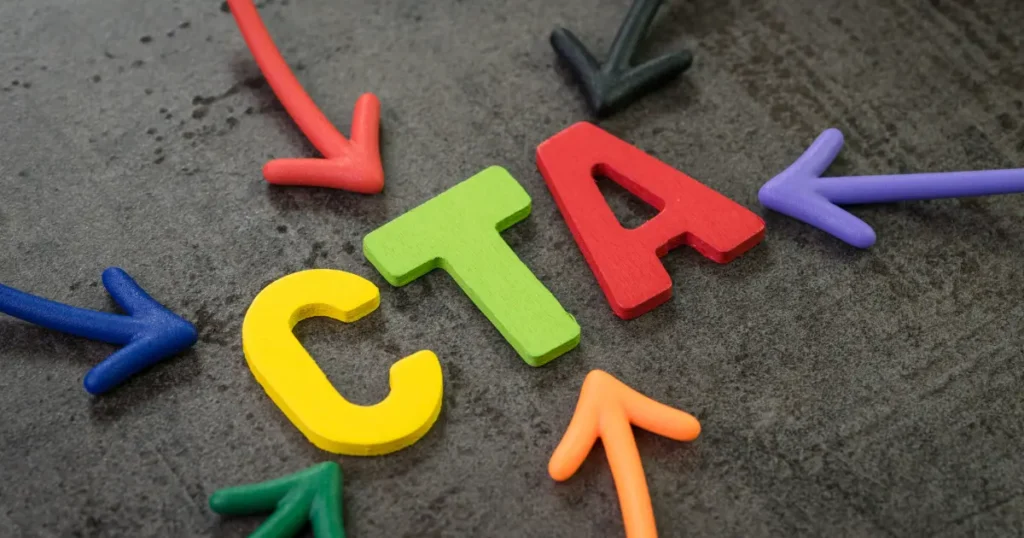
Generic phrases like “Submit” or “Click Here” don’t inspire action. Neither do buttons that blend into the background or are tucked away in corners where nobody notices them. Your e-commerce conversion rate will suffer if customers can’t easily find or feel compelled to click your “Add to Cart” button.
Instead, use action-oriented language that creates urgency or excitement. “Get My Free Guide,” “Start My Transformation,” or “Claim My Discount” work much better than boring alternatives. Make your buttons pop with contrasting colors, and place them strategically throughout your pages where they feel natural in the user’s journey.
3. Complicated Checkout and Form Processes
Nothing kills website conversions faster than a complicated checkout process. This is especially critical for e-commerce conversion rate optimization. We’ve all experienced it: you’re ready to buy something online, but the checkout process is so long and complicated that you give up halfway through.
The same principle applies to any form on your website. Whether it’s a contact form, newsletter signup, or quote request, every extra field you add reduces your conversion rate. This is one of those conversion rate mistakes that businesses make, thinking they need all that information upfront, but the truth is, you can always collect additional details later.
Streamline your forms to ask only for essential information. For e-commerce sites, offer guest checkout options and multiple payment methods. Show progress indicators so people know how many steps remain. And please, test your checkout process regularly; you’d be surprised how often technical glitches create invisible barriers to conversion.
4. Lack of Trust Signals and Social Proof
In today’s digital world, trust is everything. One of the most damaging conversion rate mistakes is failing to establish credibility with your visitors. People are naturally skeptical about buying from websites they don’t know, especially if they can’t find evidence that others have had positive experiences.
Trust signals come in many forms: customer testimonials, reviews, security badges, professional certifications, money-back guarantees, and clear contact information. Social proof shows that real people have chosen your business and been happy with the results.
Don’t just add these elements randomly, place testimonials near your key conversion points, display security badges prominently during checkout, and make sure your contact information is easy to find. When visitors see that others trust your business, they’re much more likely to convert.
If you’d like expert guidance on building that trust and improving your website conversions, Techdella’s web design and optimization services can help you create a strategy that turns visitors into loyal customers.
Technical Issues That Kill Your Conversion Rate
Beyond design and user experience, technical problems can be silent conversion killers. These conversion rate mistakes often go unnoticed because they don’t break your website completely; they just make it frustrating to use.
Slow Loading Times
Page speed is a massive factor in conversion rate optimization. Studies show that even a one-second delay in page load time can reduce conversions by 7%. Think about your own browsing habits. How long do you wait for a slow page to load before you give up and try somewhere else?

Your e-commerce conversion rate is particularly vulnerable to speed issues. Imagine a customer ready to make a purchase, but your product pages take forever to load, or the checkout process keeps spinning. They’ll abandon their cart and probably never come back.
Regularly test your site speed using tools like Google PageSpeed Insights. Optimize your images, choose quality hosting, and consider using a content delivery network (CDN) to ensure fast loading times for visitors worldwide.
Mobile Responsiveness Problems
Here’s a conversion rate mistake that’s become increasingly costly: not optimizing for mobile devices. More than half of all web traffic comes from mobile devices, yet many websites still provide poor mobile experiences.
Mobile conversion rate optimization requires more than just making your site “look okay” on phones. Your buttons need to be easily tappable, forms should be simple to fill out on small screens, and the entire user experience should feel smooth and natural on mobile devices.
Test your website on various devices and screen sizes. Pay special attention to your conversion funnel on mobile. If any step feels clunky or difficult, you’re losing potential customers. To understand just how much impact this can have on your business, take a look at our guide on the importance of a mobile-friendly website.
Advanced Conversion Rate Optimization Strategies
Once you’ve addressed the basic conversion rate mistakes, it’s time to take your optimization efforts to the next level. These advanced strategies can help you boost conversion rates and squeeze even more value from your existing traffic.
A/B Testing for Continuous Improvement
A/B testing is the cornerstone of effective conversion rate optimization. Instead of guessing what works, you can test different versions of your pages to see which ones actually convert better. This data-driven approach eliminates assumptions and helps you make decisions based on real user behavior.
Start with testing major elements like headlines, CTA buttons, and landing page layouts. Once you’ve optimized the big things, you can test smaller elements like button colors, form lengths, or image choices. The key is to test one element at a time so you can clearly identify what’s driving the improvement. For more practical tips and step-by-step strategies, take a look at our detailed guide on Landing Page Optimization
Remember, conversion testing is an ongoing process, not a one-time activity. User preferences change, new visitors have different expectations, and what worked last year might not work today. Regular A/B testing helps you stay ahead of these changes and continuously improve your conversion rate.
Personalization and Targeting
Modern conversion rate optimization goes beyond one-size-fits-all approaches. Personalizing the user experience based on visitor behavior, location, or traffic source can significantly boost your conversion rates.
For example, first-time visitors might need more information and trust signals, while returning visitors might be ready for a more direct sales approach. E-commerce sites can show personalized product recommendations based on browsing history. Service-based businesses can customize their messaging based on how visitors found their site.
While there are many DIY tools for website design and optimization, at Techdella, we help businesses save time and stress by creating modern, conversion-focused websites tailored to their specific audience and goals. Our team understands that effective personalization requires both technical expertise and a deep understanding of user psychology.
Industry-Specific Conversion Challenges
Different industries face unique conversion rate optimization challenges. Understanding these specific hurdles can help you avoid common conversion rate mistakes in your sector.
E-commerce Conversion Optimization
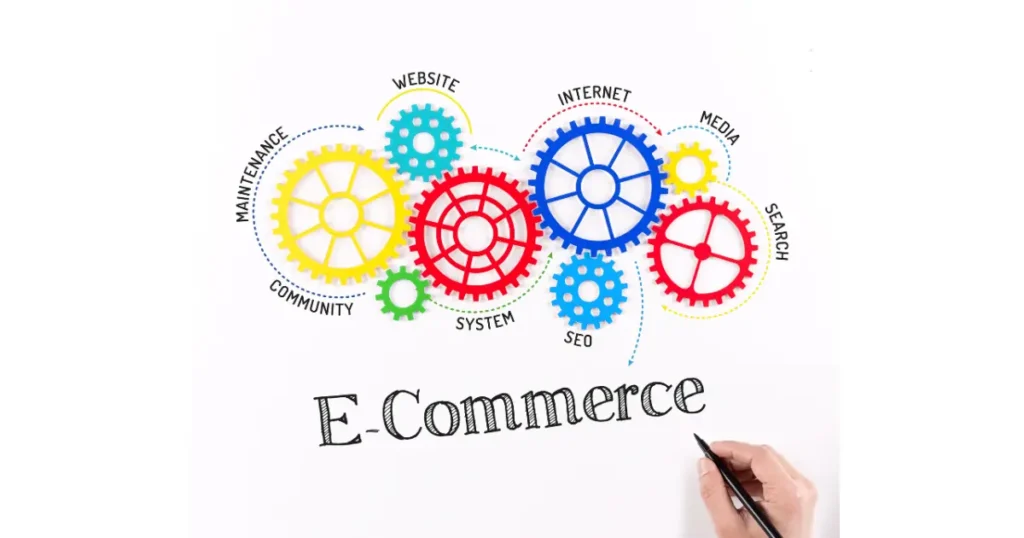
E-commerce conversion rates face particular challenges. Shopping cart abandonment rates average around 70%, meaning most people who add items to their cart never complete the purchase. Common e-commerce conversion rate mistakes include inadequate product information, surprise shipping costs, complicated return policies, and limited payment options.
Focus on creating detailed product descriptions with high-quality images, clearly communicate shipping costs upfront, offer multiple payment methods, and make your return policy easy to understand. Product reviews and ratings can significantly boost confidence and reduce hesitation at the point of purchase.
Service-Based Business Conversions
Service businesses have their own conversion challenges. Since potential clients can’t “try before they buy,” building trust becomes even more critical. Common conversion rate mistakes for service providers include vague service descriptions, lack of pricing information, and missing credentials or case studies.
Be specific about what you deliver, showcase your expertise through case studies and testimonials, and make it easy for prospects to take the next step. Whether that’s scheduling a consultation, requesting a quote, or downloading a resource, the path forward should be crystal clear.
At Techdella, we specialize in helping service-based businesses overcome these conversion challenges by creating websites that clearly communicate value and guide visitors toward meaningful action. Our approach combines conversion rate optimization best practices with industry-specific insights to maximize results.
Measuring and Monitoring Your Success
You can’t improve what you don’t measure. Proper tracking and analysis are essential for avoiding conversion rate mistakes and maintaining long-term optimization success.
Key Metrics to Track
Start with your overall conversion rate, but don’t stop there. Track conversion rates for different traffic sources, devices, and user segments. Monitor your conversion funnel to identify where visitors are dropping off. Pay attention to metrics like bounce rate, time on site, and pages per session, as these can indicate engagement issues that affect conversions.
For e-commerce sites, track metrics like cart abandonment rate, average order value, and checkout completion rates. Service businesses should monitor form completion rates, consultation booking rates, and lead quality scores.
Tools and Analytics

Google Analytics is your best friend for conversion tracking, but it’s not the only tool you need. Heat mapping tools can show you where visitors click and scroll. User session recordings can reveal friction points in your conversion funnel. A/B testing platforms help you systematically improve conversion rates over time.
The key is choosing tools that match your needs and actually using the data they provide. Many businesses make the conversion rate mistake of collecting tons of data but never acting on the insights. If you’re looking to turn those insights into real growth strategies, consider working with a Fractional CMO who can help you align your marketing goals, optimize your funnels, and drive measurable results.
Frequently Asked Questions
What’s considered a good conversion rate for my website?
Conversion rates vary significantly by industry, but generally, 2-3% is average, 5-10% is good, and anything above 10% is excellent. However, focus more on improving your own baseline than comparing to others. Even small improvements in conversion rate optimization can have massive impacts on your revenue.
How long should I run A/B tests before making decisions?
Most conversion testing experts recommend running tests for at least 2-4 weeks to account for weekly patterns and seasonal variations. You also need statistical significance, which typically requires at least 1,000 visitors per variation. Don’t stop tests too early, as this can lead to false conclusions about what works.
Should I focus on getting more traffic or improving my conversion rate?
Generally, improving your conversion rate gives you more bang for your buck than increasing traffic. If you’re converting 2% of visitors and improve to 4%, you’ve essentially doubled your results without spending more on marketing. However, both traffic and conversion rate optimization work together for maximum growth.
How often should I update my website to avoid conversion rate mistakes?
Your website should be continuously monitored and optimized. Run formal A/B tests monthly or quarterly, but keep an eye on your analytics weekly. Major updates might be needed annually or when you notice significant drops in performance. The key is staying proactive rather than reactive when it comes to conversion rate optimization.
Ready to Transform Your Website’s Performance?
Avoiding these conversion rate mistakes isn’t just about making small changes; it’s about transforming your website from a digital brochure into a powerful business tool that works 24/7 to grow your company.
The strategies we’ve covered can dramatically improve your website conversions, but implementing them effectively requires expertise, time, and ongoing attention. That’s where we come in.
At Techdella, we specialize in creating high-converting websites that avoid these common pitfalls from day one. Our team combines proven conversion rate optimization techniques with cutting-edge design and development to ensure your website not only looks great but actually drives results.
Don’t let another day pass with a website not converting as it should. Book a discovery call today, and let’s discuss how we can transform your website into a conversion powerhouse that grows your business while you sleep. Your future self will thank you for taking action now.



